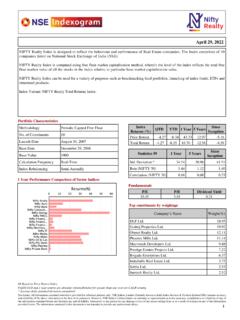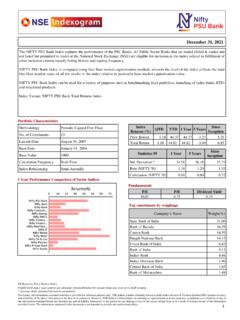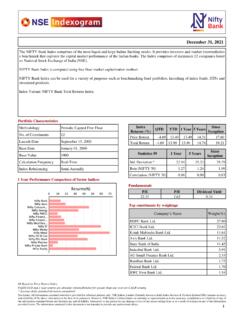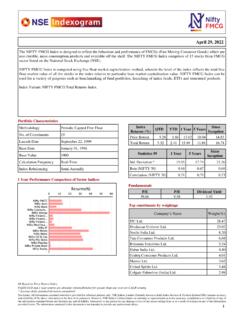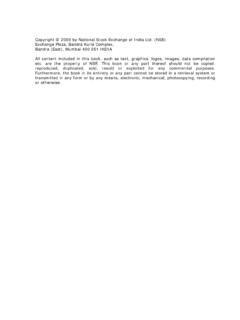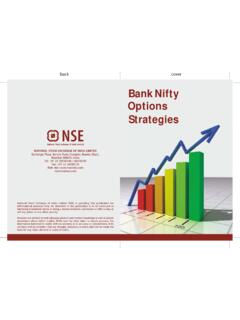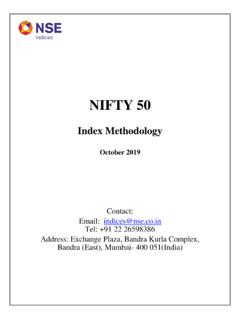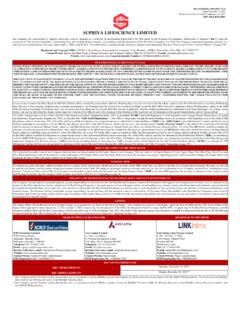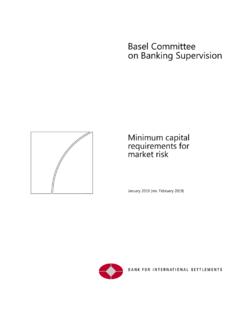Transcription of Frequently Asked Questions on Derivatives Trading At NSE
1 Frequently Asked QuestionsonDerivatives TradingAt NSENATIONAL STOCK EXCHANGE OF INDIA LIMITEDD erivatives Trading1 Questions & ANSWERS1. What are Derivatives ? Derivatives , such as futures or options, are financial contracts which derive their value from a spot price, which is called the underlying . For example, wheat farmers may wish to enter into a contract to sell their harvest at a future date to eliminate the risk of a change in prices by that date. Such a transaction would take place through a forward or futures market. This market is the Derivatives market , and the prices of this market would be driven by the spot market price of wheat which is the underlying.
2 The term contracts is often applied to denote the specific traded instrument, whether it is a derivative contract in wheat, gold or equity shares. The world over, Derivatives are a key part of the fi nancial system. The most important contract types are futures and options, and the most important underlying markets are equity, treasury bills, commodities, foreign exchange, real estate What is a forward contract? In a forward contract, two parties agree to do a trade at some future date, at a stated price and quantity. No money changes hands at the time the deal is Why is forward contracting useful? Forward contracting is very valuable in hedging and speculation.
3 The classic hedging application would be that of a wheat farmer forward -selling his harvest at a known price in order to eliminate price risk. Conversely, a bread factory may want to buy bread forward in order to assist production planning without the risk of price fl uctuations. If a speculator has information or analysis which forecasts an upturn in a price, then he can go long on the forward market instead of the cash market. The speculator would go long on the forward, wait for the price to rise, and then take a reversing transaction making a profi t. Derivatives Trading24. What are the problems of forward markets?
4 Forward markets worldwide are affl icted by several problems: (a) lack of centralisation of Trading , (b) illiquidity, and (c) counterparty risk. In the fi rst two of these, the basic problem is that of too much fl exibility and generality. The forward market is like the real estate market in that any two persons can form contracts against each other. This often makes them design terms of the deal which are very convenient in that specifi c situation for the specifi c parties, but makes the contracts non-tradeable if more participants are involved. Also the phone market here is unlike the centralisation of price discovery that is obtained on an exchange, resulting in an illiquid market place for forward markets.
5 Counterparty risk in forward markets is a simple idea: when one of the two sides of the transaction chooses to declare bankruptcy, the other suffers. Forward markets have one basic issue: the larger the time period over which the forward contract is open, the larger are the potential price movements, and hence the larger is the counter- party risk. Even when forward markets trade standardized contracts, and hence avoid the problem of illiquidity, the counterparty risk remains a very real problem. 5. What is a futures contract? Futures markets were designed to solve all the three problems (listed in Question 4) of forward markets. Futures markets are exactly like forward markets in terms of basic economics.
6 However, contracts are standardised and Trading is centralized (on a stock exchange). There is no counterparty risk (thanks to the institution of a clearing corporation which becomes counterparty to both sides of each transaction and guarantees the trade). In futures markets, unlike in forward markets, increasing the time to expiration does not increase the counter party risk. Futures markets are highly liquid as compared to the forward Trading36. What are various types of derivative instruments traded at NSE? There are two types of Derivatives instruments traded on NSE; namely Futures and Options : Futures : A futures contract is an agreement between two parties to buy or sell an asset at a certain time in the future at a certain price.
7 All the futures contracts are settled in cash at NSE. Options : An Option is a contract which gives the right, but not an obligation, to buy or sell the underlying at a stated date and at a stated price. While a buyer of an option pays the premium and buys the right to exercise his option, the writer of an option is the one who receives the option premium and therefore obliged to sell/buy the asset if the buyer exercises it on him. Options are of two types - Calls and Puts options : Calls give the buyer the right but not the obligation to buy a given quantity of the underlying asset, at a given price on or before a given future date. Puts give the buyer the right, but not the obligation to sell a given quantity of underlying asset at a given price on or before a given future date.
8 All the options contracts are settled in cash. Further the Options are classifi ed based on type of exercise. At present the Exercise style can be European or American. American Option - American options are options contracts that can be exercised at any time upto the expiration date. Options on individual securities available at NSE are American type of options. European Options - European options are options that can be exercised only on the expiration date. All index options traded at NSE are European Options. Options contracts like futures are Cash settled at Trading47. What are various products available for Trading in Futures and Options segment at NSE? Futures and options contracts are traded on Indices and on Single stocks.
9 The Derivatives Trading at NSE commenced with futures on the Nifty 50 in June 2000. Subsequently, various other products were introduced and presently futures and options contracts on the following products are available at NSE: 1. Indices : Nifty 50, CNX IT Index, Bank Nifty Index, CNX Nifty Junior, CNX 100 , Nifty Midcap 50, Mini Nifty and Long dated Options contracts on Nifty 50. 2. Single stocks - 228 8. Why Should I trade in Derivatives ? Futures Trading will be of interest to those who wish to: 1) Invest - take a view on the market and buy or sell accordingly. 2) Price Risk Transfer- hedging - hedging is buying and selling futures contracts to offset the risks of changing underlying market prices.
10 Thus it helps in reducing the risk associated with exposures in underlying market by taking a counter- positions in the futures market. For example, an investor who has purchased a portfolio of stocks may have a fear of adverse market conditions in future which may reduce the value of his portfolio. He can hedge against this risk by shorting the index which is correlated with his portfolio, say the Nifty 50. In case the markets fall, he would make a profi t by squaring off his short Nifty 50 position. This profi t would compensate for the loss he suffers in his portfolio as a result of the fall in the markets. 3) Leverage- Since the investor is required to pay a small fraction of the value of the total contract as margins, Trading in Futures is a leveraged activity since the investor is able to control the total value of the contract with a relatively small amount of margin.
